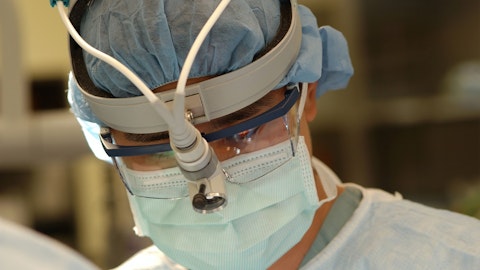LENSAR, Inc. (NASDAQ:LNSR) Q3 2023 Earnings Call Transcript November 11, 2023
Operator: Good morning, and thank you for your participation. [Operator Instructions] As a reminder, this conference call is being recorded. I would now like to turn the call over to Cameron Radinovic of Burns McClellan, Mr. Radinovic, please go ahead.
Cameron Radinovic : Thank you. Good morning, and welcome to the LENSAR Third Quarter 2023 Financial Results Conference Call. Earlier this morning, the company issued a press release providing an overview of its financial results for the quarter ended September 30, 2023. This press release is available on the Investor Relations section of the company’s website at www.lensar.com. Joining me on the call today is Nick Curtis, Chief Executive Officer of LENSAR, who will review the company’s recent business and operational progress. Following his comments, Tom Staab, Chief Financial Officer of LENSAR, will provide an overview of the company’s financial highlights before turning the call back over to the operator to facilitate answering any questions you may have.
Today’s conference call will contain certain forward-looking statements, including those statements regarding future results, unaudited and forward-looking financial information as well as the company’s future performance and/or achievements. These statements are subject to known and unknown risks and uncertainties, which may cause the company’s actual results, performance or achievements to be materially different from any future results or performance expressed or implied in this presentation. You should not place undue reliance on these forward-looking statements. For additional information, including a detailed discussion of the company’s risk factors, please refer to the company’s documents filed with the Securities and Exchange Commission, which can be accessed on the website.
In addition, this conference call contains time-sensitive information that is accurate only as of the date of this live broadcast, November 9, 2023. LENSAR undertakes no obligation to revise or update any forward-looking statements to reflect events or circumstances after the date of this live conference call. It’s my pleasure to turn the call over to Nick Curtis. Nick?
Nicholas Curtis : Thank you, Cam, and good morning to everyone. Thank you for joining us on our third quarter 2023 conference call. I’m pleased to report that we have maintained our momentum through the third quarter of this year, with 11 new ALLY systems installed and strong year-over-year growth in procedure volume, driven primarily by the continued adoption of ALLY in the United States. Through the first 9 months of 2023, we placed 29 ALLY systems and have exceeded our previously stated objective of 30 installations. Additionally, we exited the quarter end September 30 with a backlog of 8 ALLY systems pending installation. Our third quarter revenue increased 26% over the same quarter in 2022, which was supported by both robust system sales and an increase in lease revenue.
We continue to make headway into private equity-owned or -managed ophthalmology groups, which remain core to our growth strategy based on their size, scale and their focus on improved efficiencies. ALLY is significantly reducing treatment times, improving patient throughput and treatment workflow, and most importantly, increasing revenue and EBITDA for practices and ASCs. This leads to an accelerated return on investment of ALLY compared to the other competitive systems. As a result, we’re seeing multiple ALLY installations with facilities in place in ALLY unit in each OR. Our ALLY installed base totaled 39 systems as of the end of the third quarter across 31 surgical sites, with 3 sites having more than 1 system in use. We expect this trend to continue as surgeons present the results of several time and motion studies conducted in multiple facilities that demonstrate certain time savings of up to 7 minutes and staff time savings of up to 18 minutes compared to competitive systems.
These savings are realized for patients as well, with patients spending up to nearly 1 hour less in the surgical facility during their cataract procedure. Importantly, when looking at year-over-year growth globally, we observed a substantial 20% increase in total revenue during the first 3 quarters of 2023 when compared to 2022. This growth is particularly remarkable given the challenges posed by ongoing third-party payer reimbursement issues in South Korea, which have driven our revenue in that region down to zero. In the U.S. market, which remains our primary area of focus in the near term, procedure volumes increased 16% over the third quarter of 2022, while procedures among users who transitioned from our previous generation LENSAR Laser System to ALLY or added ALLY to an existing LLS deployment increased 12% over the third quarter of last year.
Importantly, the ongoing consistent adoption of ALLY and continued growth in utilization is yielding and further market share gains for LENSAR in the third quarter. According to the most recent data from MarketScope, an estimated 16.4% of all U.S. femtosecond laser-assisted cataract surgery procedures in the third quarter 2023 were performed using a LENSAR system. By comparison, our market share in the third quarter of 2022, when we were launching ALLY, was 14.1%. This equates to a 2.3% procedure market share growth in the first year of ALLY’s launch. Given our size, the gains we have achieved are impressive and exciting and further confirm the value that ALLY is delivering economically, operationally and clinically for surgeons. We recently participated in the American Academy of Ophthalmology Congress over the weekend.
And while the overall meeting turnout was moderate, we successfully conducted a remarkable 66 demos. These demos spanned across 54 practices, ambulatory surgery centers and various institutions eager to explore the potential of ALLY in their practices and centers. This underscores the growing enthusiasm for the economic and clinical advantages that ALLY brings. These demonstrations are one of several key initiatives in expanding the LENSAR pipeline. Furthermore, our financing last quarter has enabled us to begin the process of hiring additional sales managers and sales development representatives to scale the LENSAR business and ALLY’s footprint. The STR is an important new role within our organization. This team’s objective is to identify, educate, cultivate and deliver qualified leads to our sales managers.
Specifically, our STRs are responsible for initiating personalized discussions with targeted high-volume competitive femtosecond laser-assisted cataract surgery — surgeons and high-volume premium femto-naive cataract surgeons who have engaged in our digital campaigns with the goal of cultivating these relationships to shorten the sales cycle and set up appointments for our sales managers. This initiative expands our marketing efforts in a meaningful way. Our targeted approach to the market has resulted in nearly 50% of our installs in 2023 being in accounts who were previously using a competitive femtosecond laser, and 74% of our surgeon demos during the AAO were conducted with competitive femtosecond laser users. This strategy will continue to lead to an expansion of our system footprint and procedure market share.
The increase in our sales force and STRs will allow us to expand our outreach in the market. Looking ahead, in addition to expanding ALLY’s commercial footprint in the U.S., in the coming months, we expect to receive the first ALLY marketing authorizations and begin ALLY’s international launch outside the U.S. through our distribution partners. As a reminder, we submitted our application for European Union certification of ALLY in the third quarter of 2022. We remain in close contact with our distributors in Europe and elsewhere, and the enthusiasm toward ALLY in their respective markets is significant. We believe that we’re well positioned to replicate the early success we’ve seen in the U.S. abroad. We look forward to realizing ALLY’s full potential to be a global disruptive technology by becoming the dominant femtosecond laser system for premium refractive cataract surgery.
Surgeons are recognizing that the time is getting closer, and there is a need to begin replacing their old femtosecond lasers. In addition, practices that have never performed femtosecond laser surgery are beginning to understand how LENSAR’s ALLY system is addressing the limitations of the first-generation lasers that have been predominant in the market in the past. We believe that LENSAR is in a strong position to continue executing on our key strategic initiatives aimed at maximizing the success of ALLY. Now let me turn the call over to Tom to cover our financial highlights for the quarter. Tom?
Thomas Staab : Thank you, Nick. Our third quarter 2023 financial results are included in our press release issued earlier this morning, but I’d like to make some brief remarks on certain items to provide additional detail. Revenue was $9.8 million in the third quarter of 2023 compared to $7.7 million in the third quarter of 2022, reflecting a 26% increase. As Nick mentioned, the increase was primarily due to increased system sales, but we generated growth in service and lease revenue as well. We had a solid quarter of system placements and expect to place even more systems in the fourth quarter based upon ALLY demand. Accordingly, we expect to exceed the 11 ALLY systems installed in the third quarter. We have installed 29 ALLY systems through the first 9 months of 2023 and a total of 39 systems from ALLY’s launch in August of last year.
As Nick mentioned, third-party reimbursement issues in South Korea continue to be a drag on our quarterly results. Historically, South Korea has represented approximately 10% of our revenue, and revenue from this region has been nonexistent for over a year. Furthermore, we are limited to the United States as our only significant operating region in which to sell ALLY. We look forward to receiving European clearance as well as clearance in some small — in some other small operating regions in 2024. Once we receive clearance in Europe, we expect placement numbers to increase significantly as ALLY would then be cleared in 2 significant operating regions. We continue to watch South Korea and are pursuing clearance in that region, too. It was previously a significant operating region for us prior to third-party reimbursement issues, and we expect the region to return once again to being a significant contributor to our revenue in the future.
However, we cannot predict the timing of when South Korea will return to significance due to the nature of the ongoing dispute. We would like to have ALLY cleared and prepared to launch in South Korea when third-party reimbursement issues are resolved, and we are preparing for that eventuality. Gross margin for the quarter was $4.9 million, representing a gross margin of 50% compared to $3.9 million and a 50% gross margin realized in the third quarter of 2022. This matches our previously issued guidance of the low-50s and represents the larger mix of ALLY sales and revenue that carry a lower gross margin percentage than procedure sales. We continue to expect the low-50s for a gross margin percentage for 2023 and are currently sitting at 53% for the 9 months.
Total operating expenses for the third quarter of 2023 were $6.9 million compared to $8 million in the third quarter of 2022. The decrease in operating expenses was primarily attributable to significantly lower selling, general and administrative costs associated with our recording of an employee retention credit that offset approximately $1.4 million of expense. This ERC reimbursement was fully reported in the third quarter, and so no future credit is expected with this program. We intend to expand our selling organization to scale the business and drive continued ALLY growth. As mentioned in prior quarters, we will continue to innovate and invest in ALLY research and development, but we expect our R&D expenditures to be relatively stable quarter-to-quarter, with our 2023 annual investment in R&D to approximate $7 million.
Net income for the quarter was $2.6 million or $0.13 per common share, reflecting an increase over a $4 million loss and a $0.39 loss per common share in the third quarter of 2022. Our net income for the quarter was attributable to a change in fair value of our warrant liability, which created a $4.3 million gain in the quarter. Our warrant liability and the related quarterly adjustment will continue to be reported in our adjusted EBITDA presentation to allow a complete understanding and transparency of our quarterly results. As of September 30, 2023, we had cash and cash equivalents of $24.9 million as compared to $14.7 million on December 31, 2022. Cash used in the quarter was $0.5 million. That ends my remarks. And now I’d like to turn the call back over to Krista, and we look forward to your questions.
Operator: [Operator Instructions] Your first question comes from the line of Ryan Zimmerman from BTIG.
See also Bill Gates’ Portfolio of Stocks and 15 Countries with the Highest Bond Yields.
Q&A Session
Follow Lensar Inc. (NASDAQ:LNSR)
Follow Lensar Inc. (NASDAQ:LNSR)
Receive real-time insider trading and news alerts
Ryan Zimmerman : I guess to start on ALLY, it sounds like you’re really having good momentum here. Maybe just to start, Nick, for you on feedback on ALLY and kind of your existing user base, I mean, I appreciate all the time-saving metrics you’re giving. But just maybe more qualitatively, kind of what you’re hearing from the field about their use of ALLY, how they think about it in the context of other systems? And then I have some other follow-ups.
Nicholas Curtis : Sure. Thanks, Ryan. Appreciate the questions. So — about half of our business today is coming from new users to LENSAR. And most of those customers have been using the older competitive systems. And so to a T, the whole time and motion savings equating to a higher efficiency — and depending on the practice and how busy they are and maybe how many users there are either doing significantly more cases in a given surgical day or the ability to have better staff satisfaction and reducing the overhead by letting people go early, they finish their day early. And so there’s not a practice that hasn’t experienced that in the same way. The other thing that’s significant, I mentioned that 3 accounts, which is close to 10% already have more than 1 system installed in the practice or moving to the idea where they’re putting 1 in each operating room.
We didn’t expect that to happen in the first 12 months, 18 months before people would do that. And so very quickly, where I felt like people would be — were pretty invested with their competitive systems in the feeder model with the system sitting outside of the operating room. Given the ergonomics and what they’re seeing with ALLY, the desire to want to move into the operating room and save even more time and staff touches, if you will, in this is evident. So from that perspective, across the board on the competitive user side, they are anxious. And so it’s not really like it if, it’s kind of a win, like people are trying to figure out based on their own economics when it might make sense for them to make the switchover.
Ryan Zimmerman : Okay. And maybe — yes. No, that was great, Nick. And then I have a couple of others. I’m going to keep rolling here. But Tom, I mean, it looks like there was limited lease. I mean you still grew to leasing this quarter, but limited leasing then if I could just step back and think about kind of the health of your customer base, it seems like you’re not seeing any impact on capital demand, particularly in terms of the outright sale dynamics of the system relative to maybe people — I guess I would think more people would want to lease it. Although with rates higher, maybe that’s not the case. I’m just curious if you can kind of comment on kind of how you think about the macro environment in ophthalmic practices today in terms of capital demand and kind of what your mix of sales versus lease says about the customer base?
Thomas Staab : Well, I think there’s 2 observations, Ryan. One is the macro environment for large capital purchases has certainly soured because of interest rates and just the overall economy. So I think what that shows us is just the strong desire to distinguish for — or the strong desire to use ALLY as a system. And there’s an appreciation by those users that there is significant benefit over the competitive users or competitive systems. I think that right now, earlier in the launch, you’re seeing a heavier contingent of those high femto volume users converting, and they want to do even more cases faster and better the economics. I’m not so sure that going — in the future that you’re going to see that — the heavier mix on sales, just because you can’t discount the macroeconomic environment, and that is a headwind for us.



